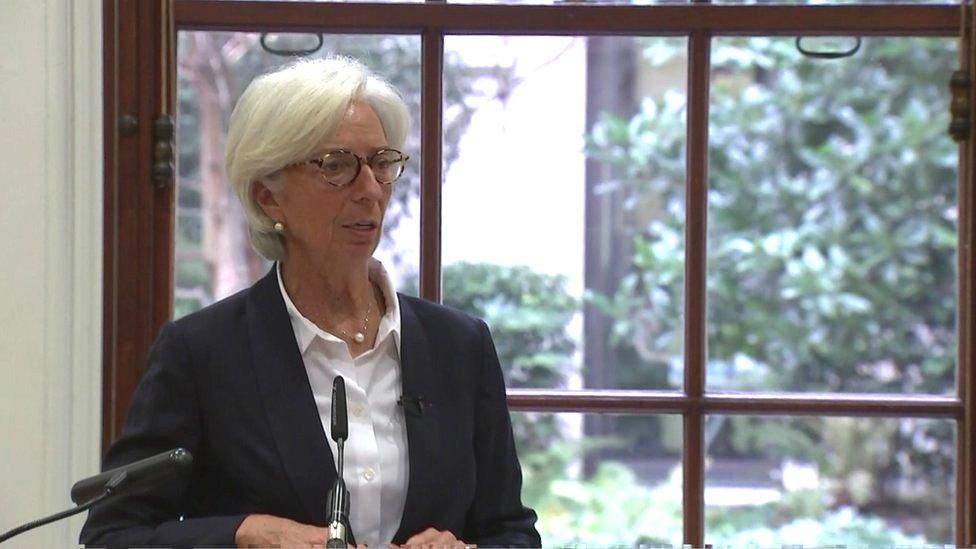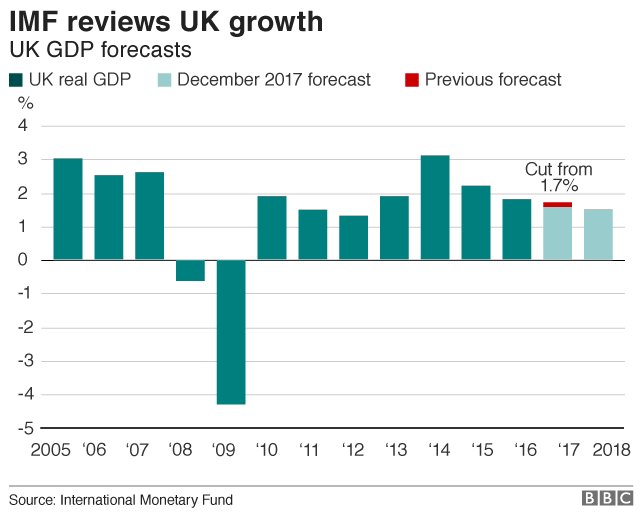IMF downgrades UK growth forecast on Brexit uncertainty
- Published
- comments

IMF chief Christine Largarde
The IMF has cut its UK economic growth forecast, blaming Brexit uncertainty.
The Fund expects growth of 1.6% this year, down slightly from its previous forecast of 1.7%. It expects growth to slow further next year, to 1.5%.
IMF chief Christine Lagarde said uncertainty over the Brexit deal was causing UK firms to delay investment plans.
She also said rising inflation, caused by the fall in the pound, and stagnant wages were squeezing spending power.
Ms Lagarde said that the government had made "significant progress" in reducing the deficit.
But she added that relative to growth in the rest of the world, "the UK is losing out as a result of higher inflation, pressure on wages and incomes and delayed investment".
"If you look at investment alone, with 2.1% of GDP in investment, with the global economy as it is, and the space the UK economy has in that global economy, it should be rolling at 6%."


Analysis by the BBC's Economics Editor Kamal Ahmed
Today, the experts fought back.
I asked Christine Lagarde at the launch of the IMF report how she responded to critics who said the IMF had been too gloomy before the referendum.
It's worth reproducing her answer in full.
"The numbers that we are seeing the economy deliver today are actually proving the point we made a year and a half ago when people said, you are too gloomy," she said.
"We were not too gloomy, we were pretty much on the mark, I mean within 0.1% or so - our forecast actually turned out to be the reality of the economy.
"Sterling has depreciated, inflation has gone up, wages have been squeezed as a result, and investments have been slowed down and are certainly lower than where we would expect them to be."
Yes, there are many positives in this report on record high employment and praise for progress on those Brexit talks.
But the big takeaway is this.
In a world of strong global growth, the IMF stands by its analysis that the UK economy has suffered since the referendum.

Productivity push
Ms Lagarde said that increased productivity was key to increasing living standards and that a new trade deal could help restore productivity levels in the UK.
She said: "The shape of the new agreement with the EU will affect productivity performance through its implications for trade, investment and migration.
"The higher are any new barriers to the cross-border flow of services, goods and workers, the more negative the impact would be."
However, Ms Lagarde also said: "Brexit has the potential to reshape the structure of the UK economy. The impact will depend on the nature of the final agreement and may take many years to fully materialise."
Brexit supporter and economist Ruth Lea said that while the fall in value of the pound had squeezed incomes, it had also helped exports.
Ms Lea, who is economic adviser to the Arbuthnot Banking Group, also said that inflation was likely to fall, which would help company and household finances.
The IMF has made dramatic changes to its growth forecasts for the UK since the Brexit referendum. Immediately after the vote in June 2016, it slashed its forecast for 2017 from 2.2% to 1.3%.
It then revised it sharply upwards at the start of this year, but since July has been steadily cutting it again.
Labour's shadow chancellor, John McDonnell, said: "The IMF has today played the role of the ghosts of Christmas past, present and future to remind the chancellor that the last seven years of Tory economic failure is undermining our economy.
"As the IMF rightly points out, despite strong global growth, UK economic growth is revised down, and business growth is down despite Tory tax giveaways to big business; while working households this Christmas are struggling with rising prices and lagging wages."